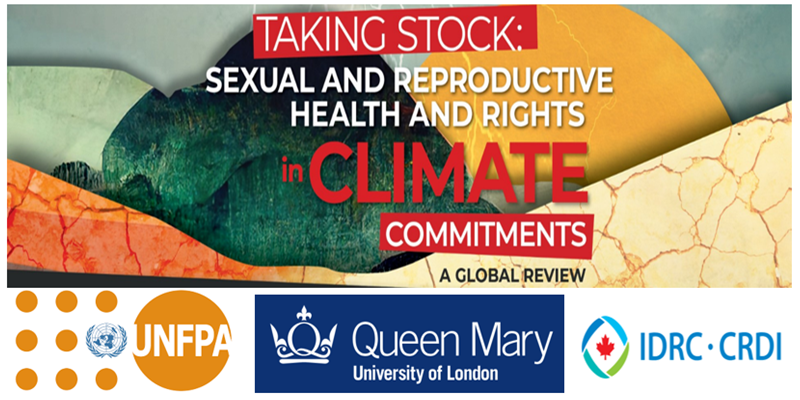Global review of Sexual and Reproductive Health and Rights in Climate Commitments
A Global review on Sexual and Reproductive Health and Rights in Climate Commitments, led by WIPH authors with colleagues from the United Nations Population Fund (UNFPA), examines the climate plans of 119 countries to determine whether they integrate access to contraception, safe birthing, and protecting women and girls from gender-based violence into their adaptation goals. Results show that only a third of countries with climate crisis plans include access to sexual, maternal, and newborn health services. The report is being launched today at a UNFPA/QMUL collaborative event in Westminster.

The lasting impacts of climate change on health disproportionately affect women and girls, who are largely dependent on natural resources for livelihoods and are among the hardest hit by extreme weather patterns that limit their access to food, water, shelter, education, and to essential health services, including those that address sexual and reproductive health and rights (SRHR), gender-based violence (GBV) and preventing harmful practices.
The study findings underscore the importance of addressing the structural drivers of inequality and discrimination that intersect with climate change impacts. This includes strengthening anticipatory actions for disasters, ensuring the provision of SRHR and GBV services, and prioritizing vulnerable groups. The report identifies specific regional differences in how countries’ nationally determined contributions acknowledged the importance of SRHR issues in national climate policies and highlights region-specific entry points for strengthening the integration of SRHR. These findings come at a critical time as we approach the conclusion of the first Global Stocktake of the Paris Agreement at COP28, a five-yearly assessment of progress on the goals set in Paris. SRHR and ensuring rights and choice for all are cornerstones of resilience and adaptation, and realizing SRHR is an indicator of a healthy and equal society.
As the climate crisis intensifies, greater investment, engagement and prioritization of SRHR, GBV and harmful practices is needed to ensure that no one is left behind, and that inequalities are not exacerbated. The launch of this report is a call to action, for UNFPA and other advocates of SRHR and GBV prevention and response, to enhance engagement with climate change mechanisms through policymakers, parliamentarians, researchers and service providers, to advocate for better understanding of the interlinkages between climate action and SRHR and GBV.
United Nations Population Fund and Queen Mary University of London (2023). Taking Stock: Sexual and Reproductive and Health and Rights in Climate Commitments: A Global Review. New York: United Nations Population Fund. 10 October 2023.